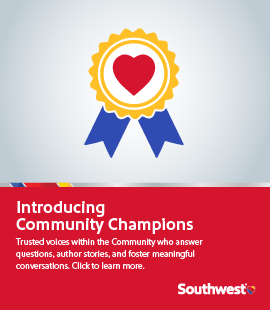10-15-2021
03:34 PM
As we reflect on advancing inclusion for people with disabilities during National Disability Employment Awareness Month, I’d like to share this testimonial, written by a Southwest Employee.
I knew deep down he was different: squirming out of hugs, preferring to play solo rather than with other kids, eating only a few types of food, and the way loud noises like bathroom hand dryers sent his hands flying over his ears with a look of sheer terror in his eyes. Other times, he was a typical little boy: playing cars, building epic Lego structures, and laughing at cartoons. I did not know about the high-functioning side of the autism spectrum, and wrote his differences off to “every child is unique.”
When the therapist told me my son was high-functioning Asperger’s syndrome, I was relieved. The clues staring me in the face for years finally had a name. My 13-year-old son who seemed obstinate, refused to share what happened to upset him, tell me who did what, or express how he felt … it wasn’t that he didn’t want to. His brain is wired differently, and he didn’t know how.
Then came the guilt–how many times had I punished him for behavior outside his control? I needed information, and I dove into every resource I could find. I discovered things I could do easily and quickly, like quit using figurative language, stop asking multiple questions at once, use written lists, and “doing” instead of “telling.” It worked, and I am always trying new ways to reach him and help him understand the nuances of life.
Now that he’s in high school, I still worry about him every day. Peers call him intense, anti-social, and depressed. Dances, pep rallies, football games–those are a hard pass from him. Only technology and video games pique his interest. It is his escape, his safe place where he can let go and be social and even display leadership skills, all behind the veil of the screen and headphones.
Each new day is a bit of a coin toss—will it be a good day or will there be a meltdown? If parenting a teenager is difficult, life with a teenager on the autism spectrum can turn parenting into an extreme sport full of creative problem solving, continuous assessing and recalibrating, and loads of patience.
At times, his differences and the struggles to help him collided with my work. I recall a season where he was severely struggling with depression and had been contemplating suicide. I knew I needed some help, but wasn’t sure what was available to me. What has helped me the most on this journey has been the chance to share and learn from my Fellow Employees—we refer to them as “Cohearts” at Southwest. Not only has it opened connections to others at Southwest who have children on the spectrum, but I’ve also learned the many ways Southwest supports Employees in my situation.
My biggest worry used to be my son’s life beyond high school. What type of job would be best for him? How will the job interview experience be for him when he struggles to look someone in the eye and communicate effectively? Then I heard about a program Southwest Airlines is launching in 2022—the Campus Reach Neurodiversity Internship Program—internships for those on the spectrum, with job coaches to help the Interns navigate our Company. Amazing! Stay tuned for more information on this program in the New Year.
... View more
Categories:
02-28-2021
09:05 AM
02-28-2021
09:05 AM
As a physician who works to enforce strict mask and visitation rules in the hospital, we make necessary exceptions to accommodate infants and individuals with intellectual disabilities who are incapable of keeping a mask on, in order to do our best to provide the same standard of care to all, regardless of disabilities. The CDC federal mask order “exempts the following categories of persons. ... A person with a disability who cannot wear a mask, or cannot wear a mask because of the disability, as defined by the Americans with Disability Act (42 U.S.C. 12101 et. Seq.) As the father of a son with Angelman Syndrome and severe neuro developmental delay who is unable to keep a mask on (but who has tolerated a full head cover hood with plastic face shield), I was disappointed to be detained with my vaccinated and face-shielded son on the walkway into SWA 3117 on February 27, on our way to see his grandfather, (whose new diagnosis of widely metastatic small cell lung cancer put him suddenly in home hospice, with family flying to San Antonio from all points to see him, possibly for the last time), as we saw several children and adults board with masks below their noses, and were told there are no exceptions at Southwest for individuals with disabilities, and that we could not board the plane. The situation caused uncomfortable drama as our detention on the walkway caused my sons agitation to escalate, caused disruption to other passengers, and prompted a tearful, compassionate effort by one SWA customer service agent to look for ways to accommodate my son by keeping adjacent rows clear on a plane that was under filled. Rachel Di Fiore, identifying herself as the highest authority on the matter at SWA, arrived to stop the effort and to tell us we had to leave, and that Southwest does not make exceptions for individuals with disabilities, that there is no higher authority than her to appeal to. I am writing to make you aware of a preventable loud scene that cast Southwest in a bad light to the public, but also to question Southwest’s rigidity around individuals with intellectual disabilities. The unfortunate scene could have been prevented if Southwest had been transparent in stating that they do not honor exemptions for individuals with disabilities, which would have helped us choose a different airline at the outset. At least 2 other airlines specifically state that they do honor exemptions to the mask mandate for individuals with disabilities, and their websites include a link to help understand who qualifies. I ask as a physician and as a father of a son with disabilities that you reconsider your company’s unwillingness to accommodate individuals with disabilities, or, if that is unchangeable policy, to at least state that lack of accommodation clearly at the time of ticketing, so customers can be spared the kind of preventable, disruptive and emotional public scene that your unexpected rigidity produced. -disappointed Southwest customer
... View more
Southwest Airlines kicked off National Disability Employment Awareness Month (NDEAM) by hosting the 2nd annual Career Day for students in the Bridges from School to Work Program (“Bridges”). Bridges helps young adults with disabilities prepare for the workplace and find jobs with companies looking for qualified, entry-level applicants. The Southwest Accommodations & Career Transitions (ACT) Team and Dallas Love Field Station Leaders created an interactive and unique experience for participants, with a behind-the-scenes look at the role of Ramp, Customer Service, and Provisioning Agents at Love Field Airport. By walking the tarmac, observing the ticket counters, and having a panel discussion, the students were exposed to a new world of job opportunities in the airline industry.
Fernando, a senior at Adamson High School in Dallas, had no idea how big an aircraft was until he stood next to one—he has only flown once, as a young child. Fernando struggled to find competitive employment until recently when he was hired at a local hospital as a part-time janitor. Good customer service is stressed at his current job, and Fernando said he was “very impressed with the level of Customer Service at Southwest. I did not realize how busy a major airport tarmac can be, and the level of Teamwork and coordination required to get everything done in a timely manner.” He also says that he “learned a few tips about good Customer Service from Southwest Leaders, and saw it first hand during the tour of the operations at Love Field. I plan to use these at my job now.”
It was a great day for all who participated. Maybe someday we’ll see Fernando, or other Bridges students, delivering that same great Customer Service on the Southwest Ramp!
... View more
Categories:

